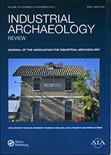
Industrial Archaeology Review
Scope & Guideline
Bridging History and Modernity in Industrial Archaeology
Introduction
Aims and Scopes
- Industrial Heritage Preservation:
The journal is dedicated to documenting and preserving the physical remnants of industrial activities, including factories, machinery, and urban infrastructure, highlighting their historical significance. - Technological Evolution:
Research often focuses on the technological advancements that shaped industrial processes, examining how innovations contributed to economic and social changes over time. - Social and Economic Contexts:
The journal explores the social and economic implications of industrial development, including labor relations, community impacts, and the role of industry in shaping urban landscapes. - International Perspectives:
The scope includes a broad international perspective, examining industrial archaeology in various global contexts, which helps to compare practices and heritage across different cultures and histories. - Archaeological Methodologies:
The use of archaeological methods to study industrial sites is a core focus, involving fieldwork, excavation, and analysis of artifacts to reconstruct historical narratives.
Trending and Emerging
- Global Industrial Histories:
Recent publications emphasize global perspectives on industrialization, exploring how different regions adapt and respond to industrial development, highlighting interconnected histories. - Urban Industrial Landscapes:
There is an increasing focus on the study of urban environments shaped by industrial activity, examining how these landscapes evolve and their implications for contemporary urban planning and heritage conservation. - Digital Archaeology and Heritage:
The integration of digital technologies in industrial archaeology, including the use of GIS and digital modeling, is gaining traction, allowing for innovative ways to document and analyze industrial sites. - Post-Industrial Heritage:
Emerging research is exploring the legacy of post-industrial landscapes, including abandoned sites and their potential for reuse and revitalization, reflecting contemporary societal shifts. - Interdisciplinary Approaches:
Collaborations across disciplines such as sociology, environmental science, and cultural studies are becoming more prominent, enriching the analysis of industrial heritage and its broader implications.
Declining or Waning
- Traditional Industrial Processes:
Research on traditional manufacturing processes, such as handcrafting techniques, appears less frequently as the focus shifts towards modern industrial practices and technological innovations. - Local Case Studies:
There has been a noticeable decrease in the number of publications centered on localized case studies of industrial sites, possibly due to a growing interest in broader thematic analyses and comparative studies. - Artisanal and Small-Scale Industries:
Themes centered around artisanal production and small-scale industries are becoming less prominent, as the journal increasingly emphasizes larger industrial systems and their global impacts. - Environmental Impact Studies:
While environmental considerations are still relevant, there has been a reduction in dedicated studies focusing solely on the ecological impacts of industrial activities, as these topics are often integrated into broader historical analyses. - Historical Narratives of Labor Movements:
Research focusing specifically on labor movements and workers' rights within industrial contexts has declined, with fewer papers dedicated to this critical aspect of industrial history.
Similar Journals
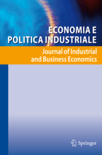
Journal of Industrial and Business Economics
Connecting scholars and practitioners in economic excellence.Journal of Industrial and Business Economics, published by SPRINGER NATURE, is a premier scholarly journal focused on disseminating cutting-edge research and practical insights within the fields of industrial and business economics. With an impact factor that reflects its importance globally, the journal serves as a vital resource for researchers, professionals, and students, contributing to advancements in knowledge and practice in business management, economics, and econometrics. The journal is recognized in the Q2 and Q1 quartiles across various categories, demonstrating its rigorous peer-review process and relevance, with notable rankings in both the Economics and Business Management categories. Its rich selection of articles drives discussions critical for understanding contemporary economic challenges and business strategies. For those seeking to stay informed in this evolving field, the Journal of Industrial and Business Economics is indispensable, providing a platform for innovative thought and scholarly exchange.

Prace Komisji Geografii Przemyslu Polskiego Towarzystwa Geograficznego-Studies of the Industrial Geography Commission of the Polish Geographical Society
Advancing Insights in Industrial GeographyPrace Komisji Geografii Przemyslu Polskiego Towarzystwa Geograficznego, also known as Studies of the Industrial Geography Commission of the Polish Geographical Society, is a pivotal open-access journal published by the Pedagogical University of Cracow, specifically by the Institute of Geography's Department of Entrepreneurship and Spatial Management. Since its inception in 2009, this journal has been dedicated to advancing the field of industrial geography, providing a platform for researchers and scholars to publish their findings and share insights related to spatial management and economic geography. With an ISSN of 2080-1653 and an E-ISSN of 2449-903X, the journal is indexed in various academic databases, helping to ensure that its contributions reach a wide audience. The importance of the journal lies in its role in fostering interdisciplinary discussions that address contemporary challenges in industrial geography, making it an indispensable resource for professionals, students, and researchers committed to understanding the complexities of spatial dynamics in industrial contexts.

Archaeologies-Journal of the World Archaeological Congress
Advancing Knowledge in Global ArchaeologyArchaeologies: Journal of the World Archaeological Congress is a premier academic journal published by Springer, focusing on the dynamic and interdisciplinary field of archaeology. With an ISSN of 1555-8622 and an E-ISSN of 1935-3987, this journal serves as a significant platform for the dissemination of innovative research, theory, and practice within the archaeological community. Hailed for its rigorous peer-review process, Archaeologies consistently ranks in the 74th percentile among its peers, currently holding a Q2 category placement in the field of archaeology as per the 2023 Scopus rankings. The journal publishes original articles, critical essays, and case studies that emphasize the cultural, historical, and methodological aspects of archaeological research from a global perspective. As a key resource for researchers, professionals, and students alike, Archaeologies facilitates critical dialogue and enhances understanding of humanity's past through archaeology. Although the journal is not open access, it provides various subscription options to ensure its valuable content remains accessible to its diverse audience.

ECONOMIC AND INDUSTRIAL DEMOCRACY
Pioneering Research for a Democratic Industrial FutureECONOMIC AND INDUSTRIAL DEMOCRACY, published by SAGE PUBLICATIONS LTD, is a distinguished academic journal dedicated to exploring the intricate interrelations between economic theories, industrial practices, and democratic governance. With an ISSN of 0143-831X and an E-ISSN of 1461-7099, this journal boasts a robust reputation in the field, illustrated by its impressive category quartiles, achieving Q1 status in Business, Management, and Accounting and Q2 rankings in Management of Technology and Innovation, Organizational Behavior, and Strategy and Management as of 2023. Published in the United Kingdom, it encompasses a comprehensive scope of research covering crucial areas that shape current industrial practices and economic policies. Researchers and practitioners alike will find invaluable insights and scholarly contributions that underpin the ongoing discourse on how democracy influences economic and industrial sectors. As it converges into its future through 2024, the journal continues to promote high-quality, peer-reviewed articles aimed at advancing knowledge and fostering innovative solutions in the field.
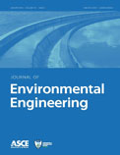
JOURNAL OF ENVIRONMENTAL ENGINEERING
Exploring innovative pathways to environmental sustainability.JOURNAL OF ENVIRONMENTAL ENGINEERING, published by the American Society of Civil Engineers (ASCE), stands as a pivotal platform within the realm of environmental engineering and civil infrastructure. With an ISSN of 0733-9372 and an E-ISSN of 1943-7870, this esteemed journal has been delivering high-quality research since its inception in 1973 and continues to play a crucial role in advancing knowledge through to 2024. The journal boasts respectable impact factors, achieving Q2 rankings in Civil and Structural Engineering, Environmental Engineering, and Environmental Science, while also maintaining a solid presence in Environmental Chemistry. With Scopus rankings reflecting a strong competitive advantage across various specializations, it serves as a vital resource for researchers, professionals, and students focused on solving complex environmental challenges. Though not an open-access publication, its rigorous selection process ensures that only high-caliber studies are disseminated, making it an indispensable read for anyone involved in the interdisciplinary fields linking engineering and environmental sustainability. Addressing contemporary issues and shaping future innovations, the JOURNAL OF ENVIRONMENTAL ENGINEERING remains committed to fostering dialogue and disseminating impactful research.

Revista de Historia Industrial
Exploring the Threads of Industrial EvolutionRevista de Historia Industrial, published by UNIV BARCELONA, DEPT HISTORIA, INST ECONOMIQUES, is a premier journal dedicated to the field of industrial history. With a proud ISSN of 1132-7200 and E-ISSN 2385-3247, this esteemed publication has been instrumental in shaping scholarly discourse since its inception in 1996, notably covering a wide array of topics related to industrial development, economic transitions, and historical methodologies through its issues published from 2011 to 2024. Distinguished by its Q1 ranking in History and its influence reflected in a 73rd percentile position among arts and humanities journals, the journal facilitates access to valuable insights for researchers, professionals, and students alike. While it is not an open access journal, its commitment to rigorous academic standards and insightful analyses ensures its relevance in the ever-evolving field of industrial history, providing an essential platform for the exchange of knowledge and innovative research. The journal's multi-faceted scope also intersects with the history and philosophy of science, making it a vital resource for interdisciplinary studies as well.

Journal of Settlements and Spatial Planning
Shaping the Future of Spatial DevelopmentThe Journal of Settlements and Spatial Planning, published by CLUJ UNIV PRESS, stands as a prominent platform dedicated to advancing research and discourse in the realms of geography, planning, and development. With an ISSN of 2069-3419 and an E-ISSN of 2248-2199, this journal has established itself since its inception in 2015, showcasing a rich array of scholarly articles that address critical issues related to spatial planning and settlement studies. As indicated by its Q3 category ranking in the 2023 Scopus database, the journal currently holds a respectable spot in the academic landscape, ranked #401 out of 821 within its field, reflecting its dedication to quality research and innovative methodologies. Researchers, professionals, and students will find valuable insights and evidence-based analyses that provoke thoughtful dialogue and inspire future studies. Operating out of Cluj Napoca, Romania, the journal caters to an international audience, emphasizing open access to a breadth of essential knowledge, thereby fostering collaboration and exploration within this vital domain of social sciences.
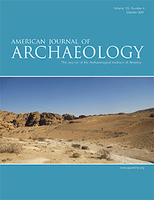
AMERICAN JOURNAL OF ARCHAEOLOGY
Connecting Cultures Through Archaeological DiscoveriesThe American Journal of Archaeology (ISSN: 0002-9114, E-ISSN: 1939-828X), published by the esteemed University of Chicago Press, stands as a leading scholarly journal in the field of archaeology, celebrated for its rigorous peer-reviewed research. With an impressive impact factor that places it in the Q1 quartile for both archaeology and archaeology within the arts and humanities, this journal ranks among the top 15% in its field, according to Scopus metrics. It serves a global audience of researchers, professionals, and students, facilitating the dissemination of innovative findings from excavations, historical analyses, and methodological advancements. While primarily available through subscription, the journal's archives and features provide invaluable resources for deepening one's understanding of the past and engaging with current archaeological discourse. Operating from its home in Chicago, USA, the American Journal of Archaeology actively contributes to the advancement of knowledge and scholarship in archaeology, making it an essential platform for those invested in the exploration of ancient civilizations and cultural heritage.
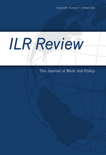
ILR Review
Exploring the Dynamics of Labor and Organizational Strategy.ILR Review, published by SAGE PUBLICATIONS INC, is a leading journal in the fields of Management of Technology and Innovation, Organizational Behavior and Human Resource Management, and Strategy and Management. With an impressive ranking in the top quartile (Q1) for all its scopes in 2023, the journal signifies a pivotal resource for scholars and practitioners alike who seek to understand the intricate dynamics of labor relations, organizational strategies, and technological advancements. The journal's ISSN number is 0019-7939 and its E-ISSN is 2162-271X. Though it does not offer open access, its rigorous peer-reviewed articles and significant insights make it essential reading for those committed to the advancement of knowledge in business and management disciplines. With a history that dates back to 1978 and a tradition of excellence reflected in its Scopus rankings, ILR Review not only solidifies its position as a cornerstone of academic research but also fosters a vibrant dialogue among professionals looking to innovate and lead in today’s dynamic environment.

Revue Archeologique du Centre de la France
Navigating the Complexities of Archaeology in Central FranceRevue Archeologique du Centre de la France is a prestigious academic journal dedicated to the field of archaeology, with a special focus on the rich historical and cultural heritage of central France. Published by FED EDITION REVUE ARCHEOLOGIQUE CENTRE FRANCE, this journal has been an open-access platform since 2004, ensuring that researchers, professionals, and students can freely access cutting-edge archaeological findings and scholarly discussions. With an acute emphasis on disseminating knowledge and fostering ongoing dialogue in archaeology, Revue Archeologique du Centre de la France serves as a vital resource for those keen to explore the complexities of French archaeological studies. Housed in Tours, this journal not only highlights regional heritage but also situates it within broader archaeological frameworks, making it an essential contribution to the field. Researchers can look forward to engaging with a diverse array of articles that cover both theoretical and applied aspects of archaeology, bolstering the understanding of our shared past.